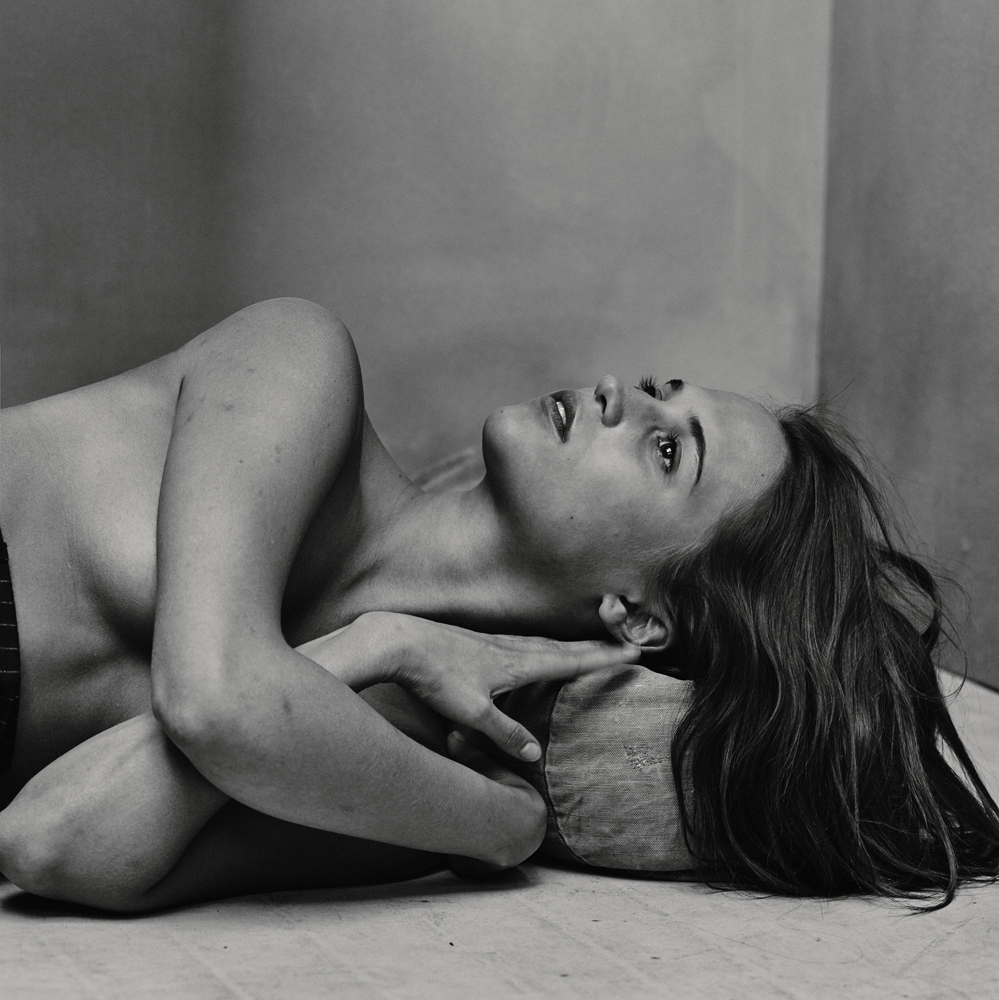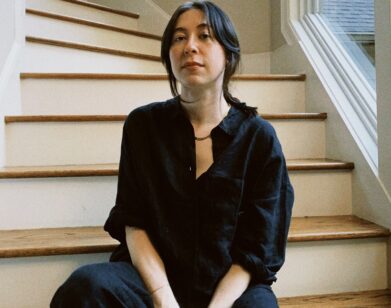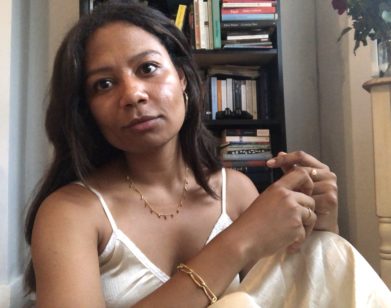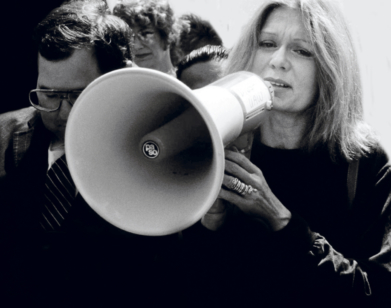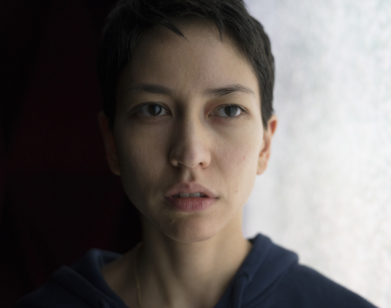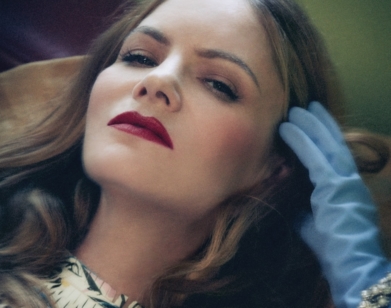Alicia Vikander
During the SXSW festival back in March, an outrageously beautiful woman named Ava drove the Tinder users of Austin crazy. “Surely she’s too good to be true,” they must have thought—and, in a way, she was.
“Ava” was, in fact, the good-enough-to-be-human AI played by Alicia Vikander in Alex Garland‘s Ex Machina, and the Tinder stunt was a brilliant bit of guerilla marketing by the film’s studio to stir up the influencers in town for the festival. Just as Ava shook up social media, Ex Machina sought to shake up our firmest sense of what constitutes humanness. And the fact that both were rather successful in their aims is a testament to the talent and dynamism of Vikander, who may now proceed to shake up our notions of movie stardom.
Vaulting out of her native Sweden and some prestigious local Scandinavian productions (including the 2012 Danish film A Royal Affair), Vikander has in very short order become, well, it in Hollywood. With six more movies on the way—including Guy Richie’s campy spy story The Man From U.N.C.L.E., alongside Armie Hammer and Henry Cavill; Derek Cianfrance‘s dark romance The Light Between Oceans, across from her rumored real-life love Michael Fassbender; and Tom Hooper’s The Danish Girl, providing more Oscar bate for Eddie Redmayne, who plays a transgender artist in the film—Vikander is primed to take the world as she once took the Texas capital.
It is seemingly a long way from her first English speaking part, in Joe Wright‘s adaptation of Tolstoy’s Anna Karenina in 2012. And as the 26-year-old Vikander told Wright this past May, it is all still a bit out of this world—almost too good to be true, though true indeed.
JOE WRIGHT: Hello, darling! How are you?
ALICIA VIKANDER: I’m good. I’m still a bit jet-lagged but otherwise great.
WRIGHT: You’ve got, like, four more films coming out this year, right?
VIKANDER: Yeah. I’ve been working since we worked together, and now they’re all coming out at the same time.
WRIGHT: Do you get worried about that, about overexposure?
VIKANDER: Yeah, I guess people might just get tired of my face.
WRIGHT: I doubt they will. And they’re all very different films. It’s unlikely that the same audience will see The Man From U.N.C.L.E. and Testament of Youth.
VIKANDER: That has made it quite fun, to be busy in very different contexts on such different projects. I’ve been terrified to begin each one of them because they’re so new to me.
WRIGHT: That’s good. Fear keeps us going.
VIKANDER: It’s the kick and the thrill of it. Like meeting you for the first time—shit, I was terrified. I remember it very well.
WRIGHT: You didn’t look scared at all. You looked quite casual.
VIKANDER: I came in while you were in edits on Hanna [2011], and I was terrified. Well, I was terrified in that room, too, because you had made it so casual. You put cute pillows on the floor and had executives and casting directors, like, pretending to be flies on the wall, while we sat on the floor.
WRIGHT: Something actors don’t realize about casting sessions is that the director is often as nervous as the actor.
VIKANDER: You should have told me. I didn’t know that. [laughs]
WRIGHT: We so want you to be right for the job. And we care, or at least I do, about how we come across. One of the things that most impressed me at the time was your training as a dancer.
VIKANDER: That was a pretty amazing thing because, after dancing six days a week several hours every day, when I quit, I did not take one class until that day for Anna Karenina. So you were the one bringing me into the studio again for the first time.
WRIGHT: Do you still dance now?
VIKANDER: I don’t. I don’t want to take classes in the same way. But I’ve been able to go to the opera a bit more. I still love to see the ballet. And I love to boogie. As soon as I get an opportunity, when I hear some music …
WRIGHT: Your mum is a theater actress, right?
VIKANDER: Yes.
WRIGHT: Do you ever think of going into the theater?
VIKANDER: I do. There was an opportunity that came to me at the beginning of this year, a piece with an actor that I look up to a lot. I called up my mom, and it was sweet. She was like, “This is probably as proud as I’ve been.”
WRIGHT: Oh!
VIKANDER: Because of dates and things, I couldn’t do it, but I felt how much it meant to me when the opportunity came. We talked about terrifying things. I applied for the Academy of Dramatic Arts in Sweden twice. I got to the last round for two years and did not get in. It feels like you’re on Idol or something, to have to go in and perform those auditions. That’s why I applied to law school, because I thought that was maybe my only way forward, especially in the small country of Sweden. But theater was definitely my aim from the beginning.
WRIGHT: And your dad being a psychiatrist, do you think that’s affected your acting?
VIKANDER: Both my mom and my dad have always included me in intelligent conversations about people, about characters, about how people work. My dad and my mom still read all scripts that I find interesting. I send them an e-mail, and I’m like, “Okay, I have my eye on this,” or whatever. And they call me up after they’ve had the time to read the scripts. It’s become a sweet tradition, because I see them so rarely now. And for me to feel like they’re included in the journey, it means a lot. And they’re very honest, too, which is great.
WRIGHT: Do you find it strange being away from Sweden so much? Do you miss it?
VIKANDER: I guess, like most foreigners, when you’re away, you see your own culture being even more strange. But where I come from and my roots mean a lot. I miss my family and my friends. Something I’ve realized as I’ve been traveling is that it’s more about the actual people than the actual place.
WRIGHT: Do you like America?
VIKANDER: I love being here, but I’ve never been here for more than a few weeks at a time. I love New York, and I would love to try to live here for a while if I ever got the chance, but it’s also extremely hectic. I don’t think I would cope with that. [laughs]
WRIGHT: When I first took a film to the States—it was Pride & Prejudice [2005]—a member of the audience said, “I don’t usually like foreign movies, but I like this one.” Obviously, I was surprised that an English-speaking film, a British film, could be called “foreign.” But I then realized how different our cultures are. Previously, I had kind of thought we all shared a culture. But it’s very different.
VIKANDER: Especially for me being really foreign. [laughs]
WRIGHT: Is it still strange acting in a foreign language?
VIKANDER: Yes. Anna Karenina was really tough. I constantly realized with the language, it’s about the filter between the thought and the actual words coming out. That has become so much thinner now for me, that filter.
WRIGHT: Does not working scare you? I’ve been working on this film for 20 or 22 months, and I’m a bit nervous about finishing because I’m kind of scared of the time that I’ll have opening up.
VIKANDER: I think so. But it kind of comes down to your body needing rest. I’ve been so tired and overworked, and I have six, seven days off—I finished a film a week and a half ago. I was longing for that week, and then, four, five days in, the thought of it really freaked me out. [both laugh] Weirdly enough, I’m only able to relax knowing that I’m going to be busy.
WRIGHT: The film you just finished shooting is The Danish Girl?
VIKANDER: Yes. Another emotionally intense project. Eddie Redmayne is an extraordinary actor, and a big part of the film was mostly just the two of us in quite a tight space in a studio. It was claustrophobic, digging so deep in a lot of issues, and very complicated relationships. And it’s exactly what I want to be doing because it’s extremely complicated and tough.
WRIGHT: And The Man From U.N.C.L.E. was the complete opposite, right?
VIKANDER: It’s fun.
WRIGHT: You’re funny!
VIKANDER: And Guy [Ritchie] was quite tough. He works in a way where you have a script, but then each morning you try to just change everything. And he’s very fluid in his work, like, “Okay, but what if we don’t say this? What do we say then?” So the first day of shooting he turns to me, and I was like, “First of all, it’s not my native language,” and he was like, “No, no, but say something funny.”
WRIGHT: Ouch.
VIKANDER: The most terrifying sentence that you can hear. And then of course I tried, and he said, “Try something else.” [both laugh] And the cameras were rolling. I was furiously mad and terrified, and basically, it is me and a bunch of guys, a very dude-ish set. But they kind of took care of me, like I was the sister. And in the end, I actually enjoyed the collaboration of trying different things and knowing that it was okay to fail big time, which I did. [laughs]
WRIGHT: One of the things I really admire about Guy’s films is that they’re tonally consistent. My films aren’t quite as tonally consistent, a little bit more schizophrenic. His all have a dexterous tone throughout the piece.
VIKANDER: Or, it can be good to throw yourself in between all of those things. That is something that I’ve seen you do, and I think it’s extremely brave.
WRIGHT: Audiences can feel uncomfortable with that because they don’t know quite where they fit, they’re allowed to laugh …
VIKANDER: But I think film is also made to kind of push an audience. So many films, you already know when you get into the theater what you’re going to see. I’d rather that filmmaking is pushing those boundaries.
WRIGHT: What was the film with Fassbender?
VIKANDER: The Light Between Oceans; it’s about a man who comes back to Australia from the first World War, and because of the trauma he’s gone through, he takes the job that nobody wants, as a lighthouse keeper. And on the way out, before he takes this three-year job, he falls in love. So he and this girl marry and go out to this island together. They live a bit of an Adam-and-Eve life in the beginning, but she has miscarriages, and one day there’s a boat, a dinghy, that comes up to the lighthouse island with a dead man and a baby in the boat. And that’s kind of where the story kicks off.
WRIGHT: That sounds amazing. You’re constantly falling in love in your films, aren’t you?
VIKANDER: I think I’m a big romantic, so being part of those stories, that’s such a big part of anyone’s life in general, that’s such a humane thing.
WRIGHT: I haven’t seen Ex Machina yet. Did you fall in love in that one?
VIKANDER: That’s complicated. Depends on how you see it, so I shouldn’t say more.
WRIGHT: Was it nice working with Domhnall [Gleeson] again?
VIKANDER: Aw, it was great. I’m seeing him today!
WRIGHT: Oh, send him my love!
VIKANDER: Yes, I will. It was great going back to work together, feeling comfortable. You kind of get to skip the whole getting-to-know-one-another thing, and you can throw yourself in there.
WRIGHT: I imagine the two of you together. I think it takes a while for actors to trust each other, and to understand each other’s rhythms. And that was something you did quite quickly with Domhnall on Anna Karenina. I think it must have been lovely to embark on a venture together already having those kind of rhythms in place. Do you remember when Domhnall got upset in rehearsals in Anna Karenina? I was asking you, in character, questions about your feelings towards Count Vronsky and your feelings toward Levin, and you compared the two of them. And Domhnall got really upset! [both laugh]
VIKANDER: [laughs] Yeah, I had totally forgotten that. He takes his job seriously.
WRIGHT: He’s a very sensitive man.
VIKANDER: He is, and you are too.
JOE WRIGHT IS AN ENGLISH FILMMAKER WHO HAS DIRECTED PRIDE & PREJUDICE, ATONEMENT, HANNA, AND ANNA KARENINA. HIS LATEST FILM, PAN, WILL BE RELEASED IN OCTOBER.
For more from the new Hollywood Heavies, click here.

